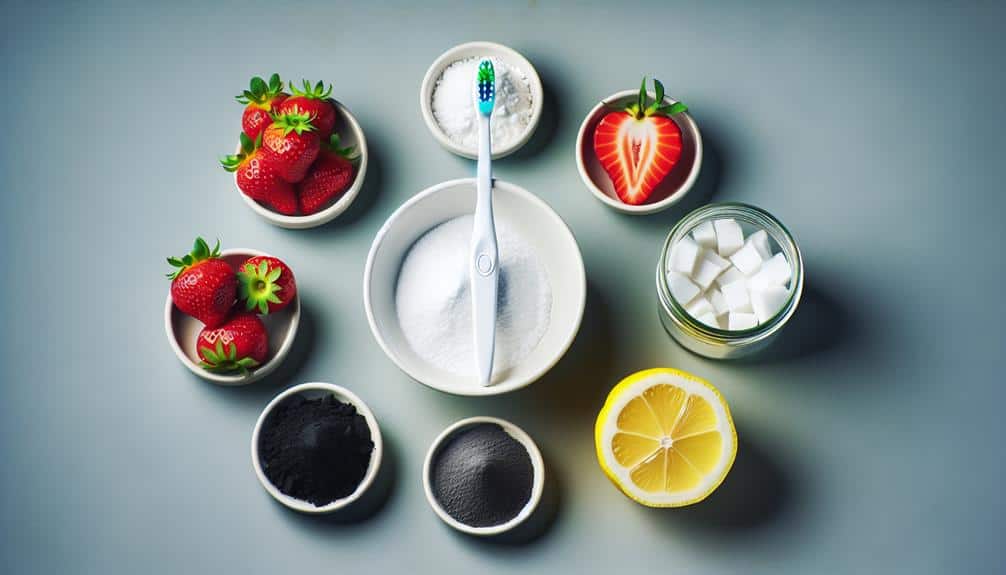To protect your sensitive gums while brightening your smile, opt for whitening products designed for sensitivity management, like those containing potassium nitrate or fluoride. Employ gentle techniques such as using foam applicators for even distribution of whitening solution and applying products in circular motions to guarantee uniform coverage. Consider natural remedies like coconut oil pulling or herbal solutions like sage. Remember, prioritizing your gum health is key to achieving a dazzling smile.
Key Points
- Opt for whitening products designed for sensitive gums
- Use gentle foam applicators for even whitening distribution
- Prioritize enamel protection when whitening teeth
- Follow product instructions carefully for best results
- Consider natural remedies like coconut oil or fruit peels
Understanding Sensitive Gums
If you experience discomfort or pain when brushing or flossing, you may have sensitive gums. Gum health is essential for overall oral health, and sensitivity management plays a significant role in maintaining healthy gums. Sensitive gums can result from various factors such as aggressive brushing, gum disease, or using harsh dental products. It's important to address gum sensitivity promptly to prevent further complications.
To guarantee good gum health, gentle oral care practices are recommended. Use a soft-bristled toothbrush and gentle, circular motions when brushing to avoid irritating sensitive gums. Flossing is equally important but should be done gently to avoid causing discomfort. Regular dental check-ups are crucial for monitoring gum health and addressing any issues early on.
When it comes to sensitivity management, choosing the right dental products is key. Look for toothpaste specifically formulated for sensitive gums and teeth. These toothpaste variants are designed to provide effective cleaning while being gentle on sensitive gums. Additionally, using a mouthwash that promotes gum health can aid in managing sensitivity. By prioritizing gum health and adopting proper sensitivity management techniques, you can maintain healthy and comfortable gums.
Choosing the Right Whitening Products
To achieve a brighter smile without compromising your sensitive gums, selecting the appropriate whitening products is vital. When choosing whitening products for sensitive gums, opt for those specifically formulated for sensitivity management. Look for products that contain ingredients like potassium nitrate or fluoride, which can help minimize sensitivity while whitening your teeth effectively. Dentists often recommend whitening toothpaste and mouthwashes designed for sensitive teeth, as they're milder and gentler on the gums.
Professional advice is important when selecting whitening products for sensitive gums. Your dentist can provide tailored recommendations based on your specific needs and oral health condition. They may suggest in-office whitening treatments or custom-made trays for at-home use. Following your dentist's guidance is crucial to achieving safe and effective whitening results without causing harm to your sensitive gums.
Remember to pay attention to brushing techniques as well. Use a soft-bristled toothbrush and gentle circular motions to avoid irritating your gums further. By combining the right whitening products with proper brushing techniques and professional advice, you can achieve a whiter smile while caring for your sensitive gums.
Gentle Whitening Techniques to Try
Consider integrating gentle whitening techniques into your oral care routine to effectively brighten your smile while prioritizing the sensitivity of your gums. When selecting whitening products, opt for those that come with a foam applicator. The foam applicator helps distribute the whitening solution evenly, reducing the risk of irritation to your gums. Additionally, look for products that offer enamel protection. Enamel protection is vital for maintaining the strength and health of your teeth while whitening them gently.
To use the foam applicator effectively, apply a small amount of the whitening product onto the foam and then gently rub it onto your teeth in a circular motion. This method guarantees that the product reaches all areas of your teeth without putting excessive pressure on your gums. Remember to follow the recommended usage instructions provided with the product to achieve the best results without compromising the sensitivity of your gums.
Natural Remedies for Brighter Smiles
Explore natural remedies that can help you achieve a brighter smile without compromising the health of your gums. When it comes to enhancing your smile naturally, consider the following options:
- DIY Remedies: Create your own teeth-whitening paste using ingredients like baking soda, hydrogen peroxide, and coconut oil. These homemade solutions can be effective and gentle on sensitive gums.
- Herbal Solutions: Incorporate herbs like sage, peppermint, or chamomile into your oral care routine. These herbs have natural whitening properties and can help freshen your breath at the same time.
- Oil Pulling: Swish a tablespoon of coconut or sesame oil in your mouth for about 15-20 minutes. This ancient practice can help remove toxins, bacteria, and stains from your teeth, promoting a brighter smile.
- Fruit Peels: Rub the inside of banana peels or orange peels on your teeth. The natural minerals and vitamins in the peels can help whiten your teeth gently over time.
Precautions for Sensitive Gums
When aiming to maintain a bright smile while having sensitive gums, it's vital to take specific precautions to guarantee the health of your gums isn't compromised. Gum health is paramount when dealing with sensitivity, so practicing proper oral care is essential.
To begin with, opt for a soft-bristled toothbrush to avoid irritation and bleeding. Brush gently in circular motions to clean effectively without harming your gums. Floss daily with a gentle hand to remove plaque and food particles without causing discomfort.
Choose a toothpaste specifically formulated for sensitive teeth and gums, as these are milder and less abrasive. When selecting a teeth whitening product, make sure it's suitable for sensitive gums, and follow the instructions meticulously. Avoid overusing whitening products, as this can aggravate gum sensitivity.
Regular dental check-ups are critical for monitoring gum health and catching any issues early. By taking these precautions, you can maintain a healthy smile without compromising your gum sensitivity.
Frequently Asked Questions
Can Sensitive Gums Impact the Effectiveness of Teeth Whitening Products?
Sensitive gums can impact teeth whitening effectiveness by causing discomfort or irritation during treatment. Prioritize gum health to guarantee the best whitening results. Consider using gentle whitening products specifically designed for sensitive gums for superior outcomes.
Are There Any Specific Foods or Drinks That Should Be Avoided After Whitening Treatments for Sensitive Gums?
After whitening treatments for sensitive gums, avoid acidic foods like citrus fruits and drinks such as coffee that can worsen sensitivity. Opt for gentle, non-acidic options like water, milk, and plain yogurt to manage sensitivity and promote post-whitening care.
How Often Should I Brush My Teeth With Whitening Toothpaste if I Have Sensitive Gums?
You should brush your teeth with whitening toothpaste twice a day if you have sensitive gums. This frequency helps maintain oral care without overstimulating your gums. Choose a toothpaste specifically designed for sensitivity to promote gum health.
Can Over-The-Counter Whitening Strips Cause Irritation to Sensitive Gums?
Over-the-counter whitening strips can irritate sensitive gums due to their strength. Consider consulting a dentist for milder options. While effective, be cautious of potential irritation. Opt for products tailored to sensitive gums to minimize discomfort and achieve desired results.
Are There Any Long-Term Effects of Using Whitening Products on Sensitive Gums?
When whitening products meet sensitive gums long term, risks can include increased sensitivity. To prevent this, adjust techniques and take precautions. Prioritize oral health, seeking professional advice if sensitivity persists. Master whitening with care.




